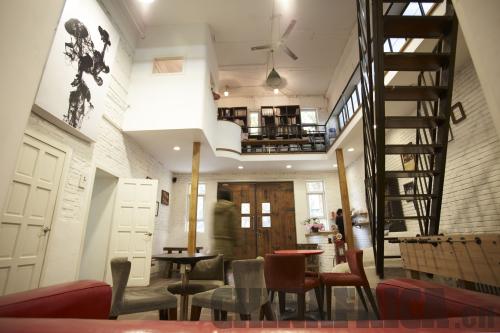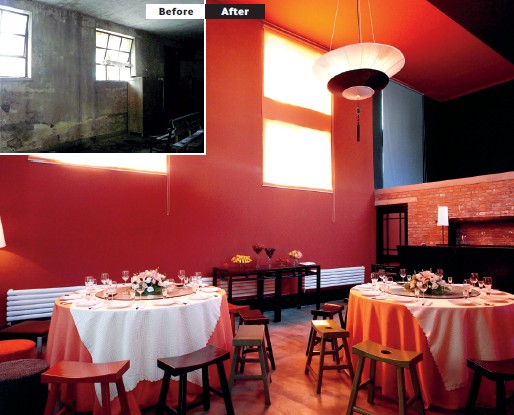| China's cultural sector will gradually grow to become a pillar industry by 2015, according to the Outline of China's Cultural Reform and Development in the 12th Five Year Plan Period (2011-15). Cultural industries are not only energy efficient, but also promote consumption and boost many other related industries. From this issue on, ChinAfrica will introduce the latest development of the country's cultural sector in traditional industries such as film and publishing, as well as up-and-coming industries, like animation, digital publishing and mobile multimedia.
 |
|
Cultural creativity parks flourish in old city factories |
How can a creative cultural space be built in old factories' workshops?
This idea comes from the 41-year-old Xue Yunda, the founder and President of Shang Ba (Cable 8) Culture Group, who has established a chain business of nine cultural industry parks in Beijing so far, housing around 300 cultural companies.
Xue's Shang Ba cultural creativity industrial park is the first of its kind established in China, and was established five years earlier than Beijing's well-known 798 Art Zone, which was built using converted Soviet-style factories.
Converting old factories
Xue was born and raised in the industrial city of Jixi in northeast China's Heilongjiang Province, and has developed a natural bond with factories.
"The old factories link the former glory of older generations and my childhood dreams," said Xue.
After graduating from Beijing Film Academy, he began his efforts to convert Beijing's old plants for creative purposes and realize his artistic dream.
In 1997, Xue rented workshops in the Beijing No. 6 Factory of Auto Maintenance. It is the first factory to be converted by Xue into a creative space.
However, it was difficult to find artists to rent his workshops in the 1990s.
"I even went from door to door persuading trade companies to rent the workshops as storehouses," he recalled.
Everything comes to him who waits. "Things began to change when a photographer who came back from France rented 300 square meters in the factory to set up his studio," he said.
Gradually, students and graduates from nearby Tsinghua University's Academy of Art & Design started coming to set up their own studios. Xue has since leased the space to artists, designers, filmmakers and cartoonists.
After Xue managed to rent out 10,000 square meters of space in the factory, he sought to expand his mission.

Developing chain business
In 2007, Xue created Shang Ba brand, or Cable 8, whose name comes from its original base – Beijing Electric Wire Cable Factory located at No.8 Langjiayuan in Beijing's Chaoyang District.
Over the past five years, the company has developed from one cultural park to a chain business of nine cultural parks, each with different focuses, housing around 300 cultural companies covering the fields of filmmaking, contemporary art, advertising, design, music and other cultural sectors.
Six of the nine parks are located in the capital's Central Business District (CBD), and the business area totals 156,000 square meters. Companies can choose from working spaces ranging from 20 to 500 square meters, depending on the nature and scale of their businesses.
Shang Ba Culture Group is the first company to run a chain business of cultural creativity parks.
"The chain aspect highlights our parks, and it rapidly enhances our brand value and influence," said Xue. "With each park featuring different characteristics, the chain business caters to the varied needs of different cultural enterprises."
Some well-known Chinese stars in the cultural and entertainment industry have also moved in and set up their studios in the parks.
"At the very beginning of developing the chain, we targeted building a high-end brand, so strict standards were set to screen the companies," Xue said.
Currently, among the 300-plus enterprises, 46 percent are film, TV and new media companies, 17 percent are in advertisement, public relations, and exhibition, print and Internet media companies make up 11 percent, and galleries account for 6 percent, according to Shang Ba Culture Group.
As of July 2012, the operating revenues of enterprises based in Xue's parks totaled over 17 billion yuan ($2.71 billion), and the taxes paid total around 1 billion yuan ($159.24 million), according to Xue.
"The ideal location and low costs of old factories are an advantage for developing cultural industrial clusters," commented Li Xin, an associate research fellow at Tsinghua University's cultural industry research institute.
"The scale effect of the chain business helps reduce the parks' operation cost, and thus reduces the running costs of each company," Li explained. "In addition, the group has built a variety of public service platforms, which benefit the companies that moved in."
|